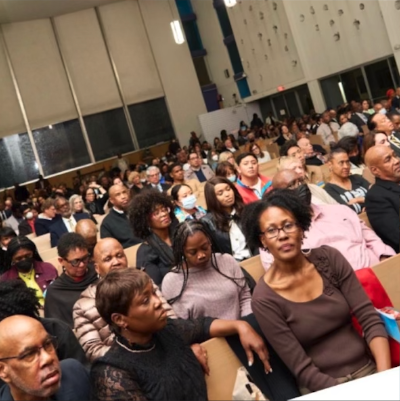OJ Simpson and his trial live well beyond his life
Most of us can remember where we were or what we were doing when the spectacle of a slow-moving SUV chase on the 405 freeway involving O.J. Simpson unfolded on the news...

By: Mansfield Collins, Esq.
May 6, 2024 . 11:58 AM 3 min read
Most of us can remember where we were or what we were doing when the spectacle of a slow-moving SUV chase on the 405 freeway involving O.J. Simpson unfolded on the news. More than two decades later, what started as a double murder followed by the infamous White Ford Bronco chase watched by nearly 100 million viewers, and ended in a jury’s acquittal, continues to reverberate to this day.
The criminal trial and the subsequent jury verdict became the impetus for television coverage, legal and otherwise, that are now commonplace. For instance, the trial gave rise to reality TV, as well as in-depth crime documentaries and court TV. Must-see-TV it isn’t; however, these shows, like the trial, capture and maintain viewers’ interest and can exert profound public influence.
Television trends aside and more importantly, the O.J. jury verdict also gave rise to the tendency to exclude Black women on juries, largely driven by prosecuting attorneys.
The state court jury that acquitted O.J. Simpson of murdering Ronald Goldman and Nicole Brown Simpson included nine Black jurors. When the jury deliberations were scrutinized post-verdict, the analysis determined that the skepticism of two Black women had an oversized impact on the deliberations. Following the analysis, it became almost automatic to exclude non-law enforcement-related Black women from the jury box, particularly in controversial cases.
Nearly 30 years later, the O.J. trial’s influence has had a significant impact on the jury selection in Dr. Mark Ridley-Thomas’ federal court case. Here, the U.S. Attorney’s Office chose to dismiss both Black women from the jury pool. For Black defendants, a jury pool that lacks substantial representation from Black jurors can impact jury deliberations and trial outcomes as well as the public perceptions of fairness. All Black jurors aren’t the same. Not surprisingly, Black men view and process life experiences differently from Black women. Jurors from different racial and gender backgrounds have varying perspectives on the criminal justice system, potentially influencing their judgment regarding a defendant’s guilt or innocence.
Disparities in jury pool composition between federal and state courts raise significant concerns about equity and justice. The Mark Ridley-Thomas case demonstrates that reforms in federal jury selection processes are necessary.
In Batson v. Kentucky, the U.S. Supreme Court determined that a prosecutor’s use of a peremptory challenge in a criminal case to dismiss jurors without stating a valid reason for doing so may not be used to exclude jurors based solely on a prospective juror’s race. In defending their removal of the only two Black women in the jury pool in Mark Ridley-Thomas’s case currently before the Ninth Circuit Court of Appeals, the U.S. Attorney’s office asserted that the jury had African American members and non-Black female members. What government prosecutors ignore is that Black women historically have faced both racial and gender discrimination on two fronts: because they are Black and because they are women. Black women face two distinct forms of discrimination that in their intersectionality constitute experiences worthy of inclusion in the deliberations of juries as peers of ALL defendants, including Black men. So, having Blacks and women of other backgrounds isn’t the same as having Black women on juries.
Lawyers at both the local and federal levels have proffered a number of proposals to address this concern, including using more inclusive lists for jury selection, adjusting geographic boundaries for drawing juries, or implementing measures to increase minority representation in voter registries and other databases used for jury selection. An alternative geographic map with an emphasis on the county where the defendant resides or where the alleged crime took place in a multi-county federal district could also be used. Without any or all of these proposed reforms, the constitutional right to a jury composed of his or her peers for Black defendants will continue to be illusory.
For Black defendants, a jury pool that lacks substantial representation from Black jurors – men and, in particular, women – can impact perceptions of reasonable doubt, a trial’s outcome and fundamental fairness. Jurors from different racial and gender backgrounds have different life experiences and, because of this, they have varying perspectives that can inform the delivery of justice the jury system is designed to secure. Differences in viewpoint have the potential to shape and influence judgments regarding a defendant’s credibility, guilt or innocence and the strength of a prosecutor’s case.
Not all federal and state cases achieve the same high-profile status 30-years after trial as do the O.J. Simpson murder proceeding. However, the impact of that trial, particularly on efforts by prosecuting attorneys to exclude Black women from jury selection, has an impact on court cases today. We’ve seen it most recently with Dr. Mark Ridley-Thomas’s trial.
It’s time that the Ninth Circuit correct this injustice and recognize the limits and short-comings of Batson v. Kentucky, and acknowledge that Black women represent the intersection of two distinct perspectives. It can do so when it rules on Mark Ridley-Thomas’s appeal later this year.
EDITOR’S NOTE: Mansfield Collins is a 40-year practitioner of criminal defense and civil law in California. He is a UCLA Law School graduate.

